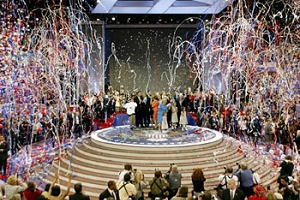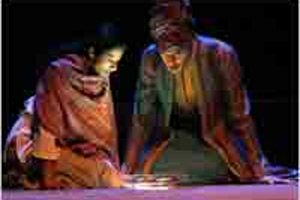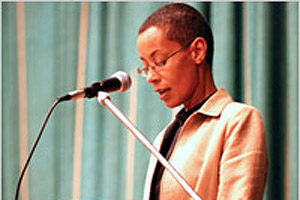Focus on America
Super-Duper Tuesday

In an attempt to expand their influence on nomination races, many states moved their primaries or caucuses to early in the year. On February 5, nicknamed "Super Tuesday" or "Super-Duper Tuesday," 24 states hold nominating contests.
Widespread use of the phrase "Super Tuesday" dates from 1988, when a group of Southern states banded together to hold the first large and effective regional group of primaries in order to boost the importance of Southern states in the presidential nomination process and lessen the impact of early votes in the New Hampshire primary and Iowa caucus. Today, the meaning of the phrase is blurred, a reflection of the fact that during the presidential primary season there may be several groups of state primaries in various regions falling on one or more Tuesdays. These groupings are important because the weight of such a large, simultaneous vote tends to make or break would-be presidential nominees since so many convention delegates are selected at once.
Super-Duper Tuesday
A phrased coined for the 2008 election, when many states, in an attempt to have more influence on the outcome of the race, have moved their primaries or caucuses to earlier in the year. This resulted in at least 24 states choosing to hold their primaries or caucuses on Tuesday, February 5, 2008, giving that day the name “Super-Duper Tuesday.”
Alabama, Arkansas, Delaware, Missouri, North Dakota, Oklahoma, Utah and West Virginia were scheduled to hold primaries or caucuses on Feb. 5. Florida, New Jersey, Michigan, California, North Carolina, Arizona, Colorado, Idaho, Montana, Nevada, New Mexico and Wyoming, together with American Samoa joined them.
Nearly 80 million registered voters will have the opportunity to cast their vote for a presidential nominee on February 5 -- the most ever on a single day in the history of primaries and caucuses.
As a result, about 42 percent of each partys delegates will be awarded on February 5. To date, 10 percent of the Republican delegates and 3 percent of the Democratic delegates have been pledged to candidates. A candidate needs a majority of delegates to become the partys nominee.
With only a few days left to make their case to a diverse set of voters, candidates are crisscrossing the country hoping to pick up enough support to propel them to the nomination. The candidates are competing to win voters in a diverse set of states. They include populous states like California and New York and sparsely populated states like Idaho and Alaska. Some states, like Illinois and New York, have sizable African-American populations; others, such as Colorado and New Mexico, are more Hispanic. Some states are heavily Republican; others tend to vote Democratic; still others are swing states.
"How do you campaign everywhere? How do you allocate media money?" are the types of issues the candidates have to consider, said Norman J. Ornstein, resident scholar with the American Enterprise Institute (AEI).
Much like in the days before a general election, the candidates are traveling throughout the country. Democrat Barack Obama will visit New Mexico, Idaho and Minnesota while his opponent Hillary Clinton talks with voters in California and New York. Republican Mitt Romney plans to visit Montana, Colorado and Missouri while John McCain heads to Tennessee, Alabama and Georgia.
For states they cannot visit, candidates are sending their most important supporters to campaign for them. The candidates also are spending heavily to run television advertisements in many of the Super Tuesday states.
"There is a very good chance … that when the dust settles on February 6 … we will not know the identities of the nominees," Ornstein said at an AEI forum January 24.
Part of the reason for this, Ornstein said, is that many states award their delegates proportionally. Democrats award all of their states delegates proportionally, while some Republican states voting on February 5 use a winner-take-all system. In states using proportional representation, a second-place finisher can still earn a sizable number of delegates.
Proportional representation "makes it much less likely that somebody can run the table and come away with enough of a lead after this point that youll be able to say [the race] is effectively over," Ornstein said.
The Democratic Partys use of proportional representation paired with the fact that the race has been a close one between Obama and Clinton for weeks leads many political experts to believe that the Democrats have a better likelihood than the Republicans of their race continuing after February 5.
Witness democracy in action as state primaries are held across the nation
On February 5, the Washington Foreign Press Center will conduct a series of briefings to cover activities surrounding the Super Tuesday state primary races and the 2008 U.S. presidential campaigns.
Witness U.S. democracy in action, hear from opinion leaders and political experts and watch the election returns from the primaries around the country.
The schedule of speakers is as follows:
3:30 p.m. Welcome and Briefing on America.gov
4-5 p.m. Thomas Mann, Brookings Institution
5:30-6:30 p.m. John Mercurio from The Hotline
7-8 p.m. John Zogby, Zogby International
8-9 p.m John Fortier, American Enterprise Institute
To provide access to these briefings, the State Department will webcast the event via a direct link on America.gov. Click the "Super Tuesday Coverage" link in the “Coming Up” section of the America.gov home page. Brief biographical information and articles by Mann, Mercurio, Zogby and Fortier also are available on the America.gov Web site.
The webcast will begin at 3:15 p.m. (2015 GMT)
Background Information:
It Could Be Over After Super Duper Tuesday http://www.cnn.com/2007/POLITICS/02/05/schneider.superduper.tuesday/index.html
Super-Duper Tuesday http://en.wikipedia.org/wiki/Super_Duper_Tuesday
Surfing the Super-Tuesday Wave http://www.csmonitor.com/2007/0723/p08s01-comv.html
USA Elections in Brief
An introduction to U.S. elections and its main players, from the federal to the local level
By Michelle Austein
Staff Writer
Recently on Focus on America
Play About Persian Folk Tale Delights Young American Audiences
 The Shakespeare Theatre Company of Washington, a showcase for the work of arguably the greatest writer in Western literature, has staged a children's play based on a Persian folk tale.
The Shakespeare Theatre Company of Washington, a showcase for the work of arguably the greatest writer in Western literature, has staged a children's play based on a Persian folk tale.
Iraqi, American Poetry Reading Bridges Cultural Divides
 “One of the treasures of poetry is that it allows full equality to all artists and freedom of expression in what defines a truly democratic society,” said U.S. Ambassador to Iraq Ryan Crocker January 15 at the first annual Iraqi/American Poetry Reading, sponsored by the U.S. Embassy in Baghdad in partnership with the Iraqi Tawasin Cultural Society.
“One of the treasures of poetry is that it allows full equality to all artists and freedom of expression in what defines a truly democratic society,” said U.S. Ambassador to Iraq Ryan Crocker January 15 at the first annual Iraqi/American Poetry Reading, sponsored by the U.S. Embassy in Baghdad in partnership with the Iraqi Tawasin Cultural Society.
Innovative Use of Online Networks Transforming Society
 If you're going to keep up with Ben MacKrell, you'll need two things: a cell phone and an account at Facebook or a similar Web site that falls under the loose term "social networking."
If you're going to keep up with Ben MacKrell, you'll need two things: a cell phone and an account at Facebook or a similar Web site that falls under the loose term "social networking."